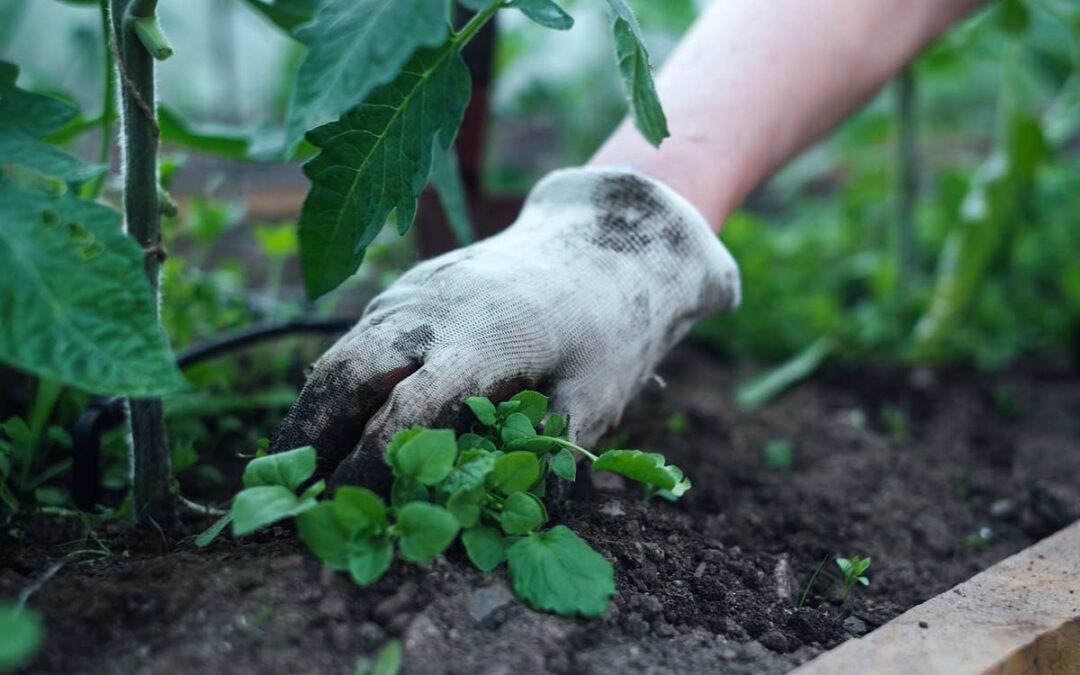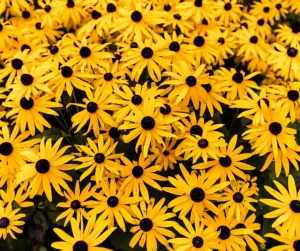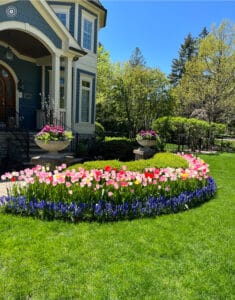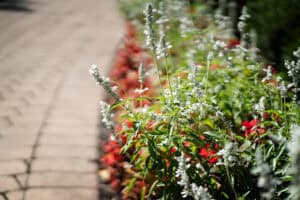Weeds are a common problem for homeowners and learning how to prevent weeds can be a challenge. They can quickly overtake your garden and make it look unsightly. Luckily, several methods of dealing with weeds can help keep them under control. We’ve outlined some of our favorite ways to prevent and treat weeds below.
Identify the types of weeds you’ve got
When it comes to weeds, there are 2 main varieties; annual and perennial.
Annual weeds typically only last one season, but they leave behind seeds that will continue their cycle. It’s best to get rid of these before they have a chance to seed. Common annual weeds in Illinois include
- Oxalis
- Crabgrass
- Chickweed
Perennial weeds spread invasively and will continue returning each year unless they are entirely removed.
- Stinging nettle
- Plantain
Once you’ve got a better understanding of the types of weeds you’ve got, you’ll be able to better deal with them.
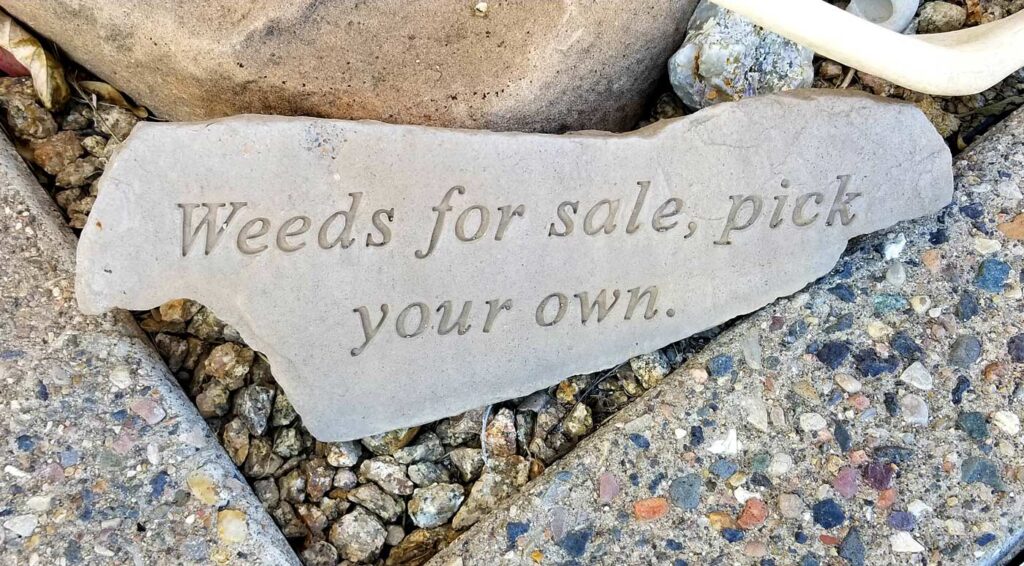
Ways to remove weeds
Weed by hand
A tried and true method of dealing with weeds is to remove them by hand or with a hoe and rake.
If you have weeds between your crops or plants, use a hoe to remove them. If you have weeds on the lawn, use a rake. If there are weeds in garden beds, use either type of tool for removing those as well.
When weeding by hand, we strongly recommend ‘doing it little and often’. By this, we mean doing a little bit of weeding as regularly as possible rather than leaving the weeds to grow. Putting in this regular effort will really pay off in the long run.
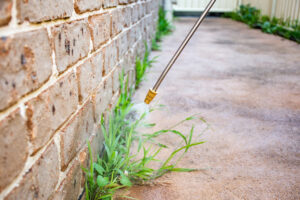 Weed with organic herbicides and pesticides
Weed with organic herbicides and pesticides
Organic herbicides and pesticides are substances that are derived from natural sources and do not involve synthetic chemicals. Organic herbicides kill weeds by disrupting their growth. They can be effective, but they also require a lot of work.
Organic herbicides include:
- vinegar-based solutions (made by mixing vinegar with water, dish soap, or vinegar with salt)
- diatomaceous earth (a powder made from fossilized shells)
Another effective option is to use boiling water. By pouring it over the weed, you’ll effectively burn their roots and prevent them from respawning.
Weed prevention methods
Adding mulch
Mulch is a useful tool for preventing weed development, but its application needs to be carefully considered. Mulch is a substance that is spread over the soil to retain moisture and prevent weed growth. However, adding too much mulch or stacking it too close to plant bases can lead to a number of issues, including rotting. Applying a thin layer of mulch—ideally no more than 2-3 inches—and making sure it is not too close to plant bases are essential if you want to prevent these problems. Additionally, it’s crucial to select the right kind of mulch for your plants and soil type. For example, straw or grass clippings are perfect for vegetable gardens while wood chips are great for shrubs and trees.
Have good garden hygiene
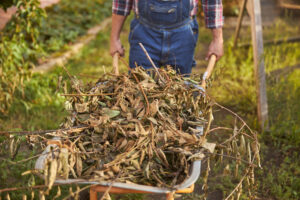 To stop weeds from growing, it is essential to maintain appropriate garden hygiene. Organic material, such as decaying plant matter and fallen leaves, can foster an environment that is favorable to the growth of pests and weeds. Therefore, it’s essential to properly dispose of these materials on a regular basis in order to maintain the garden’s cleanliness. Additionally, cleaning your gardening equipment after each use is essential for stopping the transmission of disease and weed seeds. You can keep your garden free of unwelcome weeds and pests and preserve the health and beauty of your plants by maintaining good garden hygiene.
To stop weeds from growing, it is essential to maintain appropriate garden hygiene. Organic material, such as decaying plant matter and fallen leaves, can foster an environment that is favorable to the growth of pests and weeds. Therefore, it’s essential to properly dispose of these materials on a regular basis in order to maintain the garden’s cleanliness. Additionally, cleaning your gardening equipment after each use is essential for stopping the transmission of disease and weed seeds. You can keep your garden free of unwelcome weeds and pests and preserve the health and beauty of your plants by maintaining good garden hygiene.
Use cover crops
An efficient and long-lasting strategy to enhance soil health and lessen weed growth is by using cover crops. These crops act as a shield for the soil, stopping erosion and bringing in vital nutrients that can help the primary crop. Due to their competition for resources and ability to shade the soil, cover crops can also assist prevent weed germination. It’s crucial to take the planting season and the particular requirements of your primary crop into account when choosing a cover crop. Rye is a strong option for winter cover, while clover is a popular choice for nitrogen fixation. A quick-growing alternative that works well as a summer cover crop is buckwheat.
Use pre-emergent herbicides
Pre-emergent herbicides are a powerful tool in your toolbox if you want to stop weeds from taking over your garden. These pesticides work by preventing the germination and establishment of weed seeds in your soil. Pre-emergent herbicides must be used in the spring, before weed seeds begin to germinate. Follow the label’s directions carefully, though, as improper use of these pesticides can potentially limit the growth of beneficial plants. To ensure the herbicide soaks deeply into the soil and stops weed growth, irrigate the soil well after application.
Use weed barriers
A weed barrier can be a powerful tool in the fight against troublesome weeds. This physical barrier, which is covered with soil before planting and made of materials like plastic or landscape fabric, acts as a barrier against the growth of weeds. A weed barrier is particularly useful for big areas like vegetable gardens or flower beds, but it needs to be properly secured to prevent gaps or holes from serving as access points for weeds.
Best way to dispose of the weeds
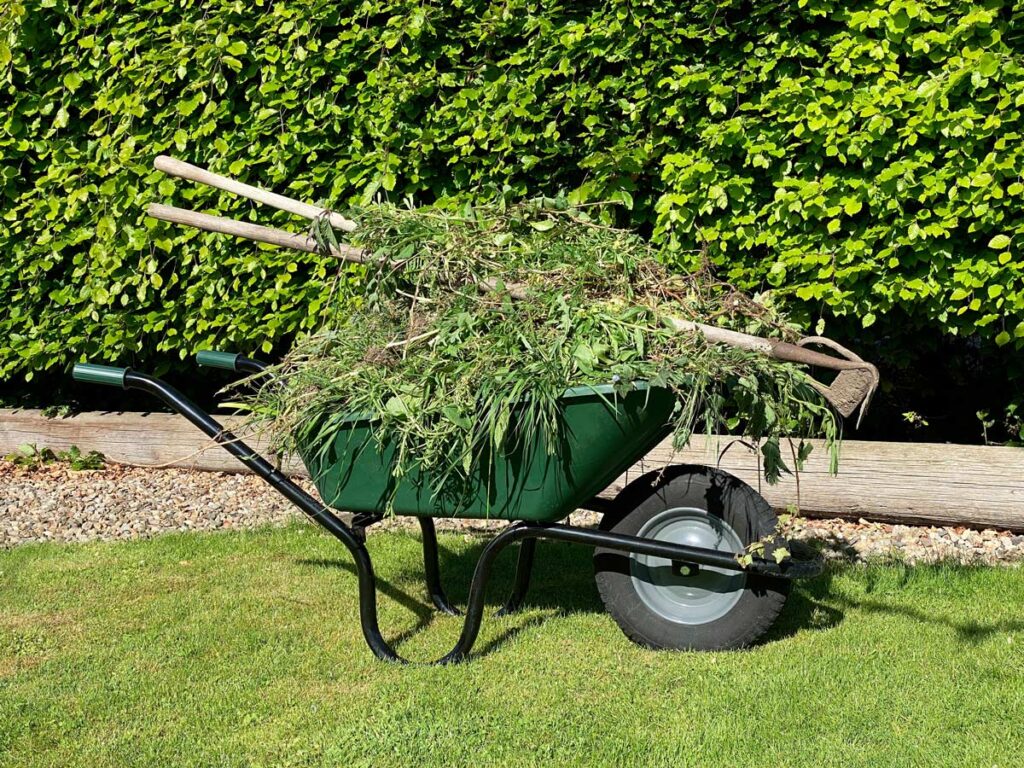
Now you may just be wondering, what should I do with all these weeds once I’ve removed them? While it may be tempting to add them to your existing compost heap, this can often cause more harm than good. Weed seeds can lay dormant for many years and can crop up at the most inconvenient of times. The best way to get rid of weeds is to take them to your local landfill or organize a landscaping company to remove them.
If you want to keep your garden looking beautiful and lush, then it’s important to take care of weeds. Weeds can ruin the aesthetic value of your yard and make it look unkempt if not properly taken care of. With the tips above, you should be able to effectively deal with weeds and prevent them from coming back!
If you need help with your weed maintenance, then you have come to the perfect place! American Gardens offers many services to ensure that your landscaping is in tip-top shape! Contact us today to learn more about our services.



